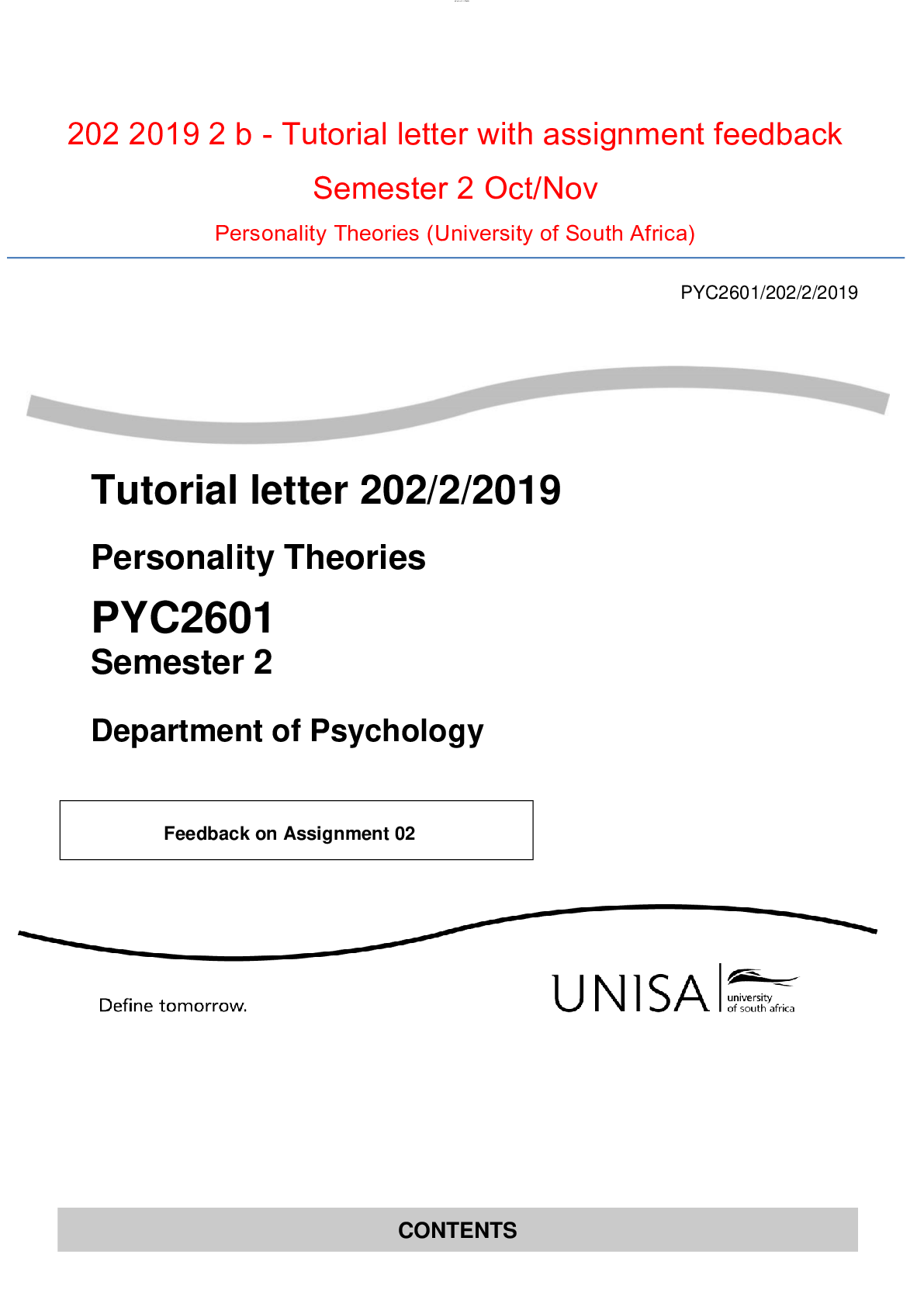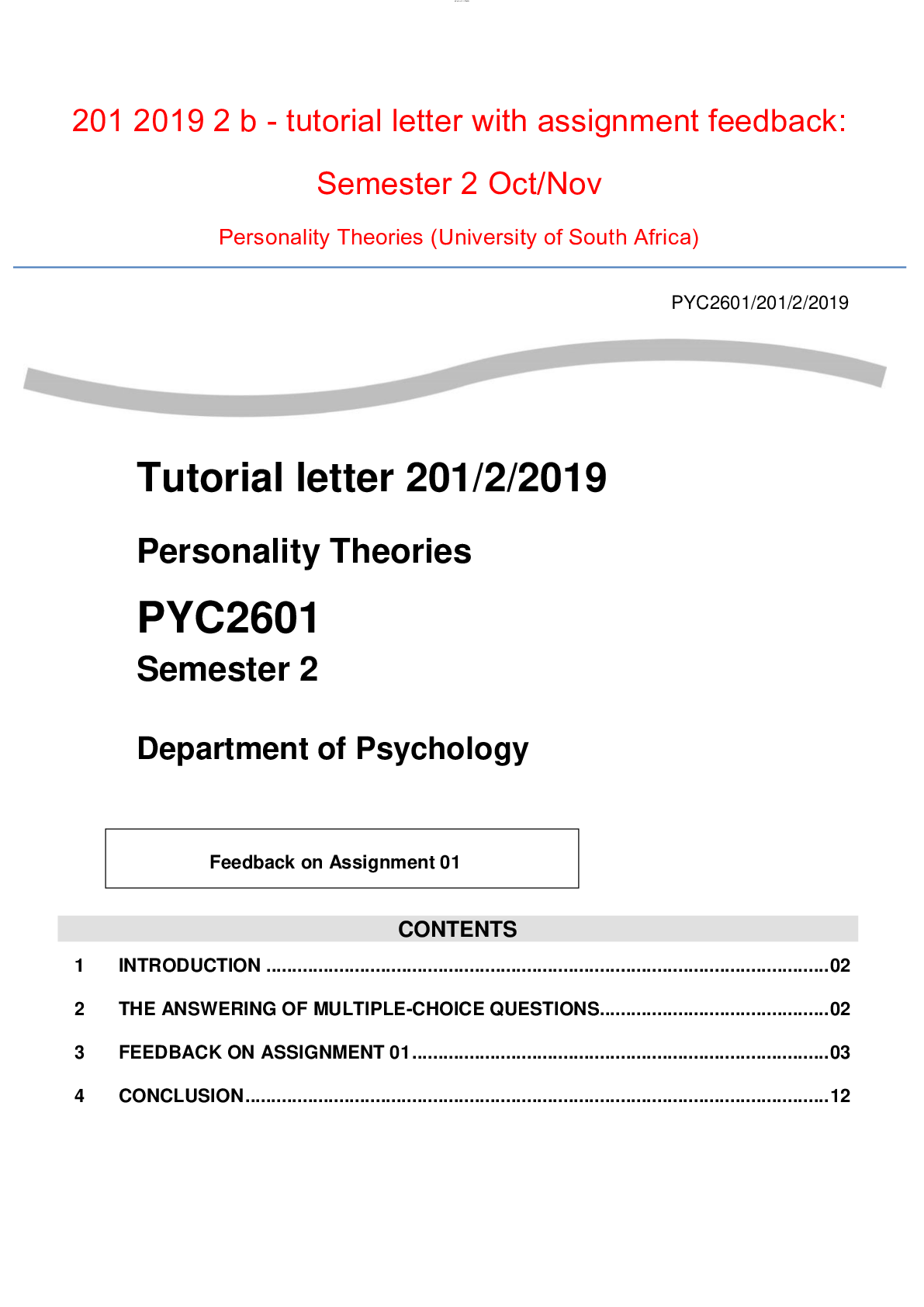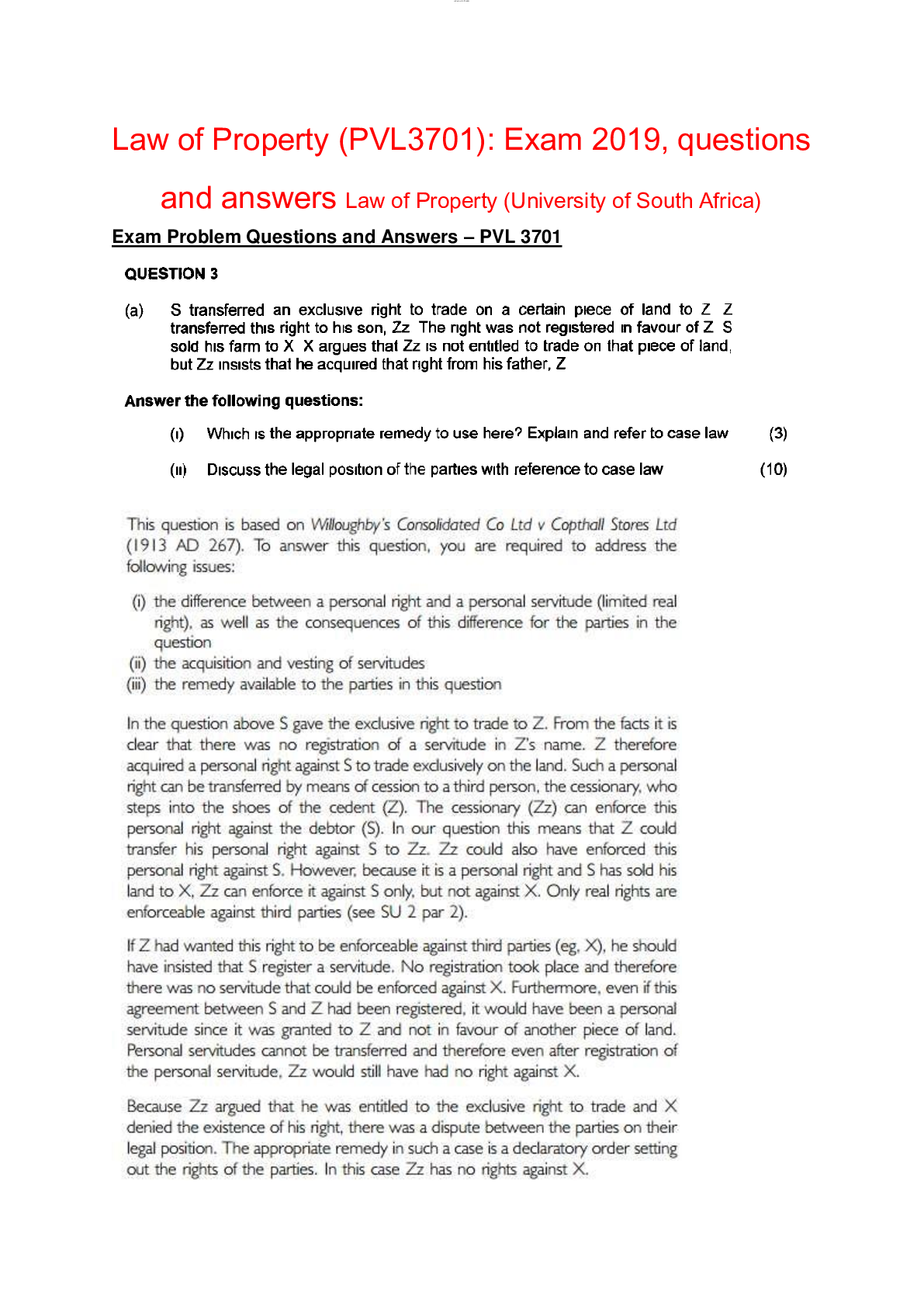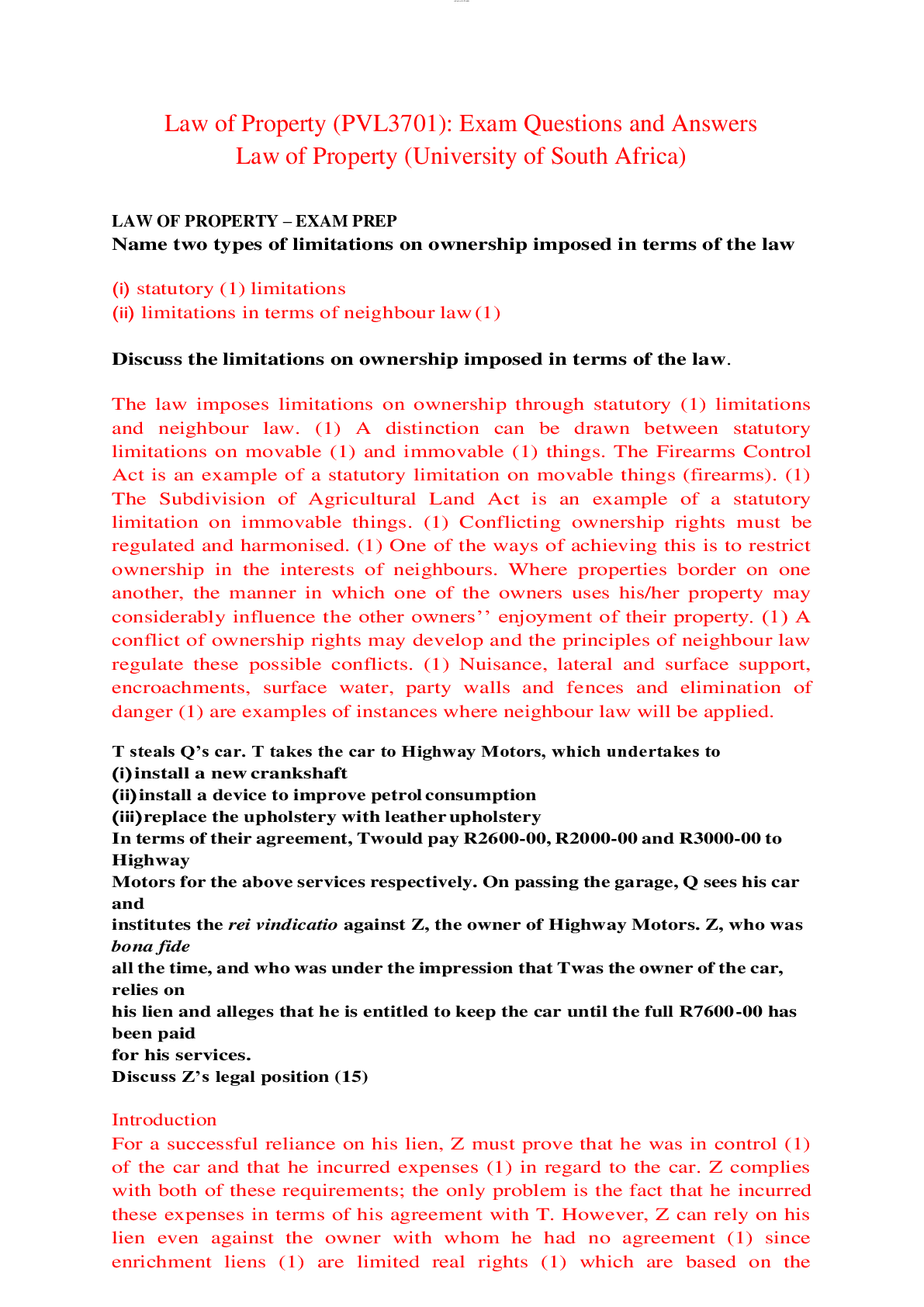Psychology > EXAM > PYC2603 - Assignment 1 Answers Semester 1 2020 ADULTHOOD AND AGING (University of South Africa) PYC2 (All)
PYC2603 - Assignment 1 Answers Semester 1 2020 ADULTHOOD AND AGING (University of South Africa) PYC2603 Assignment Answers for Semester 1 2020 Assignment 01 – Semester Unique Number – 879001. 100%
Document Content and Description Below
PYC2603 - Assignment 1 Answers Semester 1 2020 ADULTHOOD AND AGING (University of South Africa) PYC2603 Assignment Answers for Semester 1 2020 Assignment 01 – Semester Unique Number – 879001 ... Question 01 Reasons for dividing adulthood into substages include: (a) Adulthood may stretch over a period of 50 years or longer. (b) It is difficult to accurately define the stage of adulthood. (c) There is a gradual ageing of the world population. (d) Adulthood brings along continued changes in all areas of development. The correct answer is: (1) (a) & (d) (2) (a), (b) & (d) (3) (b), (c) & (d) (4) All of the above Question 02 According to the … model that guides development, human behavior results from external forces upon which the individual passively reacts. Development is seen as … and … in nature. (1) organismic; discontinuous; qualitative (2) interactionist; multidirectional; multidimensional (3) mechanistic; organismic; interactionist (4) mechanistic; continuous; quantitative Question 03 Theories that explain ageing as a result of external or environmental factors are known as …. An example of these is …, which states that unpaired electrons cause cellular damage that can result in dementia and heart disease. (1) programmed ageing theories; genetic programming theory (2) error theories; free radical theory (3) programmed ageing theories; cross-linking theory (4) error theories; wear and tear theory Question 04 Most developmental psychology theories of ageing are ... based, with the most popular assumption that that ageing occurs at a ... level and that ... ageing is also more prominent than other forms of ageing. (1) psychologically; molecular; emotional (2) socially; cultural; social (3) biologically; genetic; physical (4) cognitively; cellular; cerebral Question 05 During menopause an imbalance in the hormonal system is caused by the secretion of exceptionally large quantities of.... and... . (1) estrogen; progesterone (2) androsterone; estrogen (3) testosterone; androsterone (4) follicle-stimulating hormone; luteinising hormone Question 06 Certain symptoms that resemble the female climacteric have been found in men. This phenomenon is referred to as the male.... (1) andropause (2) climacteric (3) perimenopause (4) menopause Question 07 Which of the following statements regarding sexuality in late adulthood are false? (a) Older people have the physiological need and capacity to have sex. (b) Geropsychological factors are related to decline in sexual activity in later years. (c) Cultural biases stereotype older women as asexual when they are no longer able to reproduce. (d) Adults who were more sexually active during their younger years tend to be more active during their later years as well. The correct answer is: (a) (a) & (d) (b) (b) & (c) (c) (a), (c) & (d) (d) All of the above Question 08 Which of the following findings regarding the sexual practices of South African university students are true? (a) Female students tended to have more sexual partners than men. (b) A lack of condom use was evident among some students, although the majority believed that contraceptives should be used. (c) The students were generally concerned about contracting HIV/AIDS. (d) Most men and many women had concurrent sexual relationships outside their steady relationships. (e) Many did not approve of premarital sex, but indicated it was too difficult to abstain until marriage, while the majority believed that sex between people in love is acceptable. The correct answer is: (1) All of the above (2) (a), (b) & (c) (3) (c), (d) & (e) Question 09 The human cognitive system works much like a computer and proceeds through various steps to complete information processing. The underlying theoretical basis of this explanation is that specific acts of this cognitive process, such as … and … largely explain the final specific … or …, which can be influenced by …. (1) encoding; analysis; functioning; performance, the frontal lobe (2) attention; memory; response; reaction, general ageing (3) interpretation; reaction; data; information; the parietal lobes (4) encoding; memory; processing; understanding; problem-solving strategy Question 10 Which of the following statements regarding the rate of processing information and aging are incorrect? (a) Neural activity from previous processing causes interference in response speed as we age. (b) There are major differences between younger and older adults’ reaction times for simple tasks. (c) Older adults have a slower reaction rate as they set a more conservative response criteria (d) Automatic responses are affected by age and are slower in older adults. The correct answer is: (1) (a) & (b) (2) (b) & (d) (3) (b) & (c) (4) None of the above Question 11 A distinction is made in memory research between … memory and … memory. The former refers to … whereas the latter refers to … . (1) semantic; implicit; memory for general knowledge; memory for personally meaningful events (2) episodic; procedural; memory for personally meaningful events; passive memory retention (3) prospective; semantic; future orientated memory; memory for general knowledge (4) autobiographical; explicit; memory for personal life events; memory for general knowledge Question 12 Which of the following types of intelligence are not included in Sternberg’s triarchic theory of intelligence? (a) Creative/experiential (b) Spatial/physical (c) Analytic/componential (d) Practical/tacit (e) Bodily/kinaesthetic The correct answer is: (1) (a) & (d) (2) (b) & (e) (3) (b), (c) & (e) (4) All of the above Question 13 Tumi has been a successful athlete since his late teens and was particularly passionate about basketball, which he trained for every day. However, as he is now older there has been a shift in his physical activities. He still enjoys being athletic, but he now plays golf rather than basketball. This suggests that Bob is experiencing … . (1) selection (2) optimisation (3) compensation (4) prioritization Question 14 The culturally inclusive wisdom model has developed a three-dimensional wisdom model (Ardelt as cited in Louw & Louw, 2019) that refers to the ability to perceive phenomena from multiple perspectives. This is known as the … dimension. (1) cognitive wisdom (2) compassionate wisdom (3) reflective wisdom (4) integrative wisdom Question 15 The five-factor theory groups personality characteristics into five broad trait dimensions. These dimensions include.... (1) neuroticism; openness; conscientiousness (2) openness; the self-concept; identity (3) identity; neuroticism; conscientiousness (4) openness; stability; change Question 16 Which of the following statements are assumptions of Erik Erikson’s psychosocial theory of personality development? (2) Each stage is characterised by a crisis during which the individual must attain certain tasks or adjustments. (3) Each task has two opposing poles (positive versus negative) and the solution of each crisis lies in choosing the positive pole. (4) The development from one stage to another requires a simple interaction of biological, psychological and social forces. Question 17 The environment is important in determining behavior because …. (1) genes affect people’s experiences with the environment. (2) development is determined by the environment only. (3) the environment affects how people respond to the environmental influences. (4) the environment affects the types of environment people interact with. Question 18 Which of the following statement is incorrect about possible selves? (1) Possible selves tend to remain stable and are measurable with psychological tests. (2) Possible selves motivate people to set and achieve goals to fulfil their hoped-for possible selves and to avoid the feared possible selves. (4) Possible selves represent what we would like to become and what we are afraid of becoming. Question 19 When people accept technology as tool to do activities such as shopping, research, and social integration, they exhibit … (1) identity accommodation (2) identity assimilation (3) an identity threshold experience (4) identity balance. Question 20 Older people tend to experience a co-occurrence of positive and negative emotions. This process is known as… . (1) effects (2) poignancy (3) situation selection (4) attentional deployment. [Show More]
Last updated: 2 years ago
Preview 1 out of 10 pages

Buy this document to get the full access instantly
Instant Download Access after purchase
Buy NowInstant download
We Accept:

Reviews( 0 )
$4.00
Can't find what you want? Try our AI powered Search
Document information
Connected school, study & course
About the document
Uploaded On
Jul 29, 2020
Number of pages
10
Written in
Additional information
This document has been written for:
Uploaded
Jul 29, 2020
Downloads
0
Views
329











.png)














